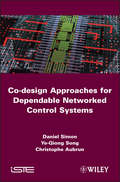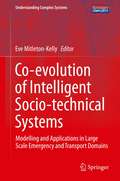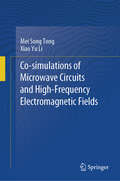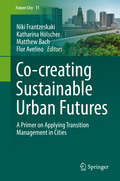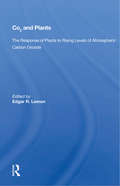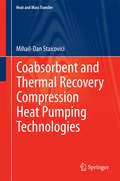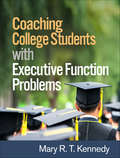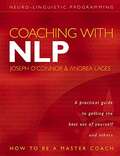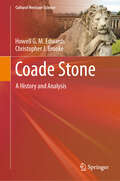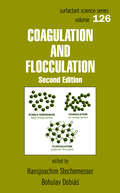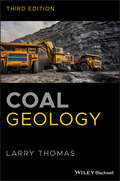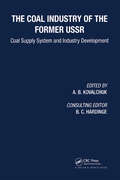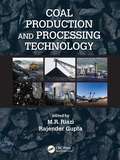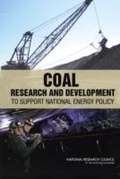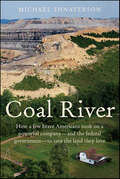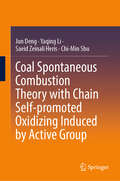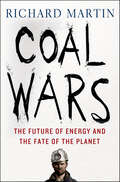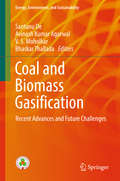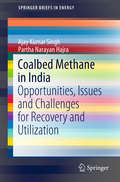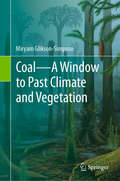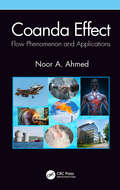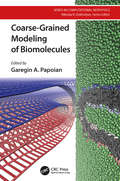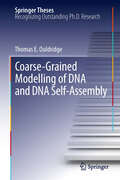- Table View
- List View
Co-design Approaches to Dependable Networked Control Systems
by Daniel Simon Christophe Aubrun Ye-Qiong SongThis book describes co-design approaches, and establishes the links between the QoC (Quality of Control) and QoS (Quality of Service) of the network and computing resources. The methods and tools described in this book take into account, at design level, various parameters and properties that must be satisfied by systems controlled through a network. Among the important network properties examined are the QoC, the dependability of the system, and the feasibility of the real-time scheduling of tasks and messages. Correct exploitation of these approaches allows for efficient design, diagnosis, and implementation of the NCS. This book will be of great interest to researchers and advanced students in automatic control, real-time computing, and networking domains, and to engineers tasked with development of NCS, as well as those working in related network design and engineering fields.
Co-evolution of Intelligent Socio-technical Systems: Modelling and Applications in Large Scale Emergency and Transport Domains (Understanding Complex Systems)
by Evangelia Mitleton-KellyAs the interconnectivity between humans through technical devices is becoming ubiquitous, the next step is already in the making: ambient intelligence, i.e. smart (technical) environments, which will eventually play the same active role in communication as the human players, leading to a co-evolution in all domains where real-time communication is essential. This topical volume, based on the findings of the Socionical European research project, gives equal attention to two highly relevant domains of applications: transport, specifically traffic, dynamics from the viewpoint of a socio-technical interaction and evacuation scenarios for large-scale emergency situations. Care was taken to investigate as much as possible the limits of scalability and to combine the modeling using complex systems science approaches with relevant data analysis.
Co-simulations of Microwave Circuits and High-Frequency Electromagnetic Fields
by Mei Song Tong Xiao Yu LiThis book aims to provide many advanced application topics for microwave circuits and high-frequency electromagnetic (EM) fields by using advanced design system (ADS) and high-frequency structure simulator (HFSS) as simulation platforms. In particular, it contains the latest multidisciplinary co-simulation guidance on the design of relevant components and devices. Currently, the circuit/field design and performance analysis and optimization strongly rely on various kinds of robust electronic design automation (EDA) software. RF/microwave engineers must grasp two or more types of related simulation design software. ADS by Keysight and HFSS by Ansys are the representative for circuit simulations and for field and structural simulations of microwave devices, respectively. At present, these two types of software are widely used in enterprises, universities, and research institutions. The main purpose of this book is to enable readers, who are interested in microwave engineering and applied electromagnetics, to master the applications of these two tools. It also helps readers expand their knowledge boundaries behind those types of software and deepen their understanding of developing interdisciplinary technologies by co-simulations. The book is divided into three parts. The first part introduces the two latest versions of ADS and HFSS and helps readers better understand the basic principles and latest functions better. It also advises how to choose appropriate simulation tools for different problems. The second part mainly describes co-simulations for high-frequency EM fields, microwave circuits, antenna designs, EM compatibility (EMC), and thermal and structural analyses. It provides guides and advices on performing co-simulations by ADS and HFSS incorporated with other types of software, respectively. The last part narrates the automation interfaces and script programming methods for co-simulations. It primarily deals with the Advanced Extension Language (AEL), Python Data Link (PDL), and MATLAB interface in ADS. For HFSS, it discusses VBScript, IronPython scripting, and Application Programming Interface (APIs) based on MATLAB. Each topic contains practical examples to help readers understand so that they can gain a solid knowledge and skills regarding automated interfaces and scripting methods based on these kinds of software. Concisely written in combination with practical examples, this book is very suitable as a textbook in introductory courses on microwave circuit and EM simulations and also as a supplementary textbook in many courses on electronics, microwave engineering, communication engineering, and related fields. As well, it can serve as a reference book for microwave engineers and researchers.
Co-creating Sustainable Urban Futures: A Primer on Applying Transition Management in Cities (Future City #11)
by Niki Frantzeskaki Katharina Hölscher Matthew Bach Flor AvelinoThis is a unique book that provides rich knowledge on how to understand and actively contribute to urban sustainability transitions. The book combines theoretical frameworks and tools with practical experiences on transition management as a framework that supports urban planning and governance towards sustainability. The book offers the opportunity to become actively engaged in working towards sustainable futures of cities. Readers of this book will be equipped to understand the complexity of urban sustainability transitions and diagnose persistent unsustainability problems in cities. Urban planners and professionals will build competences for designing transition management processes in cities and engaging with multidisciplinary knowledge in solution-seeking processes. The heart of the book marks the variety of very different local case studies across the world - including, amongst others, Rotterdam in the Netherlands, La Botija in Honduras, Sydney in Australia and Cleveland in the US. These rich studies give inspiration and practical insights to young planners on how to create sustainable urban futures in collaboration with other stakeholders. The case studies and critical reflections on applications of transition management in cities offer food for thought and welcome criticism. They also introduce new lenses to understand the bigger picture that co-creation dynamics play in terms of power, (dis-)empowerment, legitimacy and changing actor roles. This will equip the readers with a deep understanding of the dynamics, opportunities and challenges present in urban contexts and urban sustainability transitions.
Co2 And Plants: The Response Of Plants To Rising Levels Of Atmospheric Carbon Dioxide
by Edgar R. LemonThis book presents information on the direct effects of increased atmospheric CO2 on plants. It considers what we already know about plant responses to various CO2 concentrations. .
Coabsorbent and Thermal Recovery Compression Heat Pumping Technologies (Heat and Mass Transfer)
by Mihail-Dan StaicoviciThis book introduces two of the most exciting heat pumping technologies, the coabsorbent and the thermal recovery (mechanical vapor) compression, characterized by a high potential in primary energy savings and environmental protection. New cycles with potential applications of nontruncated, truncated, hybrid truncated, and multi-effect coabsorbent types are introduced in this work Thermal-to-work recovery compression (TWRC) is the first of two particular methods explored here, including how superheat is converted into work, which diminishes the compressor work input. In the second method, thermal-to-thermal recovery compression (TTRC), the superheat is converted into useful cooling and/or heating, and added to the cycle output effect via the coabsorbent technology. These and other methods of discharge gas superheat recovery are analyzed for single-, two-, three-, and multi-stage compression cooling and heating, ammonia and ammonia-water cycles, and the effectiveness results are given. The author presents absorption-related topics, including the divided-device method for mass and heat transfer analysis, and truncation as a unique method for a better source-task match. Along with advanced gax recovery, the first and second principles of COP and exergy calculation, the ideal point approaching (i. p. a. ) effect and the two-point theory of mass and heat transfer, the book also addresses the new wording of the Laplace equation, the Marangoni effect true explanation, and the new mass and heat exchangers based on this effect The work goes on to explore coabsorbent separate and combined cooling, heating, and power (CHP) production and advanced water-lithium bromide cycle air-conditioning, as well as analyzing high-efficiency ammonia-water heat-driven heating and industrial low-temperature cooling, in detail Readers will learn how coabsorbent technology is based on classic absorption, but is more general. It is capable of offering effective solutions for all cooling and heating applications (industry, agriculture, district, household, etc. ), provided that two supplying heat-sink sources with temperatures outdistanced by a minimum of 12-15ºC are available This book has clear and concise presentation and illustrates the theory and applications with diagrams, tables, and flowcharts.
Coaching College Students with Executive Function Problems
by Mary R. Kennedy Mckay Moore SohlbergAlthough executive function difficulties are often addressed in school-age children, there are few resources showing how to help these individuals when they are older. This book presents a dynamic coaching model that helps college students become self-regulated learners by improving their goal-setting, planning, time management, and organizational skills. Ideal for use with students with attention-deficit/hyperactivity disorder (ADHD), learning disabilities, acquired brain injury, and other challenges, Mary R. T. Kennedy's approach incorporates motivational interviewing and emphasizes practical problem solving. User-friendly features include numerous concrete examples, sample dialogues, and print and online resource listings. In a large-size format for easy photocopying, the book contains 21 reproducible forms. Purchasers get access to a Web page where they can download and print the reproducible materials for repeated use.
Coaching With NLP: How To Be a Master Coach
by Joseph O'Connor Andrea LagesA practical guide to using NLP in business and life coaching from bestselling NLP expert Joseph O’Connor. This book is suitable for both established coaches and for those who are being coached. <p><p> Neuro-Linguistic Programming (NLP) is the psychology of excellence. It is based on the practical skills that are used by all good communicators to obtain excellent results. These skills are invaluable for personal and professional development. <p><p> NLP provides most, if not all, of the skills necessary to become a full time coach or a manager who coaches. This book will help all those looking to have any level of involvement in coaching either as a coach or as the recipient of coaching. NLP enables the coaching process to be faster with fewer meetings, a great benefit in today’s time-pressured industries. <p><p> This book is one of the first to combine business and life coaching with NLP. It provides guidelines and skills for an improved all-round performance as a coach, along with the skills necessary to look after, organize and coach yourself. It provides a comprehensive guide to coaching that will meet the needs of all, no matter what their involvement in coaching.
Coade Stone: A History and Analysis (Cultural Heritage Science)
by Howell G. Edwards Christopher J. BrookeThe history and nature of artificial stone for use in architecture is a subject still shrouded in myth and misconception. This book aims to lay bare those misconceptions and present a scientific and architectural account of these materials, and especially Coade Stone, the most successful of all, which found great favour during the Georgian period. Many examples of Coade Stone cast sculpture still exist and several key examples are presented in context and as case studies . Eleanor Coade’s artificial stone was so good that many observers could not distinguish it from the natural stone it replaced: the growth in replication of the neo-classical statuary and building adornment required in the late Georgian and Regency period was well satisfied by the use of Coade stone. A holistic evaluation of Coade stone artefacts is undertaken whereby the use of analytical data, historical documentation, invoices, company records, impressed marks and expert connoisseurship will establishthe attribution of Coade stone artefacts, some of which are currently in the unknown category. Several new scientific analyses are presented that demonstrate the true nature of high temperature fired ceramic Coade Stone and allow comparison with other forms of artificial stone, such as the cold cured cementitious variations, which eventually replaced it in the Victorian period.
Coagulation and Flocculation
by Hansjoachim Stechemesser Bohulav DobiášFirst published in 1993, Coagulation and Flocculation is a practical reference for the researchers in the field of the stabilization and destabilization of fine solid dispersions. By omitting chapters that remained unchanged from the first edition, the editors of this second edition completely update, rewrite, and expand upon all chapters to reflec
Coal Geology
by Larry ThomasA global exploration of coal geology, from production and use to chemical properties and coal petrology Coal Geology, 3rd Edition, offers a revised and updated edition of this popular book which provides a comprehensive overview of the field of coal geology including coal geophysics, hydrogeology and mining. Also covered in this volume are fully revised coverage of resource and reserve definitions, equipment and recording techniques together with the use of coal as an alternative energy source as well as environmental implications. This third edition provides a textbook ideally suited to anyone studying, researching or working in the field of coal geology, geotechnical engineering and environmental science. Fills the gap between academic aspects of coal geology and the practical role of geology in the coal industry Examines sedimentological and stratigraphical geology, together with mining, geophysics, hydrogeology, environmental issues and coal marketing Defines global coal resource classifications and methods of calculation Addresses the alternative uses of coal as a source of energy Covers a global approach to coal producers and consumers
Coal Industry of the Former USSR: Coal Supply System and Industry Development
by A. B. Kovalchuk B. C. HardingeThe Coal Industry of the Former USSR presents a two-part study of coal supply systems and development of the industry in the territory of the former USSR. The first part covers the role of coal in the economy, provides an overview of current status and forecast of the eight major coal basins and environmental problems associated with the industry.
Coal Production and Processing Technology (Fuels and Petrochemicals)
by M. R. Riazi Rajender GuptaCoal Production and Processing Technology provides uniquely comprehensive coverage of the latest coal technologies used in everything from mining to greenhouse gas mitigation. Featuring contributions from experts in industry and academia, this book:Discusses coal geology, characterization, beneficiation, combustion, coking, gasification, and liquef
Coal Research And Development: To Support National Energy Policy
by National Research Council of the National AcademiesCoal will continue to provide a major portion of energy requirements in the United States for at least the next several decades. It is imperative that accurate information describing the amount, location, and quality of the coal resources and reserves be available to fulfill energy needs. It is also important that the United States extract its coal resources efficiently, safely, and in an environmentally responsible manner. A renewed focus on federal support for coal-related research, coordinated across agencies and with the active participation of the states and industrial sector, is a critical element for each of these requirements. Coal focuses on the research and development needs and priorities in the areas of coal resource and reserve assessments, coal mining and processing, transportation of coal and coal products, and coal utilization.
Coal River: How a Few Brave Americans Took On a Powerful Company —and the Federal Government—to Save the Land They Love
by Michael ShnayersonOne of America's most dramatic environmental battles is unfolding in southern West Virginia. Coal companies are blasting the mountains, decapitating them for coal. The forested ridge tops and valley streams of Appalachia—one of the country's natural treasures—are being destroyed, along with towns and communities. An entire culture is disappearing, and to this day, most Americans have no idea it's happening.Michael Shnayerson first traveled to the coal fields four years ago, on assignment for Vanity Fair. There he met an inspiring young lawyer named Joe Lovett, who was fighting mountaintop removal in court with a series of brilliant and daring lawsuits. He also met Judy Bonds, whose grassroots group, the Coal River Mountain Watch, was speaking out in a region where talking truth to power was both brave and dangerous. The two had joined forces to take on Massey Energy, the largest and most aggressive of the coal companies, and its swaggering, notorious chairman, Don Blankenship.Coal River is Shnayerson's account of this dramatic struggle. From courtroom to boardroom, forest clearing to factory floor, Shnayerson gives us a novelistic and compelling portrait of the people who risked their reputations and livelihoods in the fight against King Coal.
Coal Spontaneous Combustion Theory with Chain Self-promoted Oxidizing Induced by Active Group
by Jun Deng Chi-Min Shu Yaqing Li Saeid Zeinali HerisThis book provides a scientific basis for development of targeted inhibitors and directional inhibitors of preventing spontaneous combustion of coal. This book applied solvent extraction assisted by ultrasonic into the study of coal spontaneous combustion and hence broken through the technical bottlenecks of existing studies for mechanisms of coal spontaneous combustion. Further, the theories of particles physics were firstly combined with theories of coal chemistry and finally explained some previous conjectures scientifically in this book. Thus, the theory of spontaneous combustion of coal has been greatly broadened and deepened. Moreover, a new theory named &“Chain self-promoted oxidizing coal spontaneous combustion theory induced by active group&” was proposed in this book. This theory elucidates the correlation mechanism between coal active groups and indicator gases, explaining the mechanism of indicator gas generation in coal spontaneous combustion and providing a theoretical basis for establishing an early warning indicator system for coal spontaneous combustion. This is very easy to be understood by audience with working in the field of mining or coal chemistry. Besides, principles of theories used in this book were explained in detail in this book. That is to say, there are almost no challenges or pain points for the audiences to overcome.
Coal Wars: The Future of Energy and the Fate of the Planet
by Richard MartinSince the late 18th century, when it emerged as a source of heating and, later, steam power, coal has brought untold benefits to mankind. Even today, coal generates almost 45 percent of the world's power. Our modern technological society would be inconceivable without coal and the energy it provides. Unfortunately, that society will not survive unless we wean ourselves off coal. The largest single source of greenhouse gases, coal is responsible for 43 percent of the world's carbon emissions. Richard Martin, author of SuperFuel, argues that to limit catastrophic climate change, we must find a way to power our world with less polluting energy sources, and we must do it in the next couple of decades—or else it is "game over." It won't be easy: as coal plants shut down across the United States, and much of Europe turns to natural gas, coal use is growing in the booming economies of Asia— particularly China and India. Even in Germany, where nuclear power stations are being phased out in the wake of the Fukushima accident, coal use is growing. Led by the Sierra Club and its ambitious "Beyond Coal" campaign, environmentalists hope to drastically reduce our dependence on coal in the next decade. But doing so will require an unprecedented contraction of an established, lucrative, and politically influential worldwide industry. Big Coal will not go gently. And its decline will dramatically change lives everywhere—from Appalachian coal miners and coal company executives to activists in China's nascent environmental movement. Based on a series of journeys into the heart of coal land, from Wyoming to West Virginia to China's remote Shanxi Province, hundreds of interviews with people involved in, or affected by, the effort to shrink the industry, and deep research into the science, technology, and economics of the coal industry, Coal Wars chronicles the dramatic stories behind coal's big shutdown—and the industry's desperate attempts to remain a global behemoth. A tour de force of literary journalism, Coal Wars will be a milestone in the climate change battle.
Coal and Biomass Gasification: Recent Advances and Future Challenges (Energy, Environment, and Sustainability)
by Avinash Kumar Agarwal Santanu De V. S. Moholkar Bhaskar ThalladaThis book addresses the science and technology of the gasification process and the production of electricity, synthetic fuels and other useful chemicals. Pursuing a holistic approach, it covers the fundamentals of gasification and its various applications. In addition to discussing recent advances and outlining future directions, it covers advanced topics such as underground coal gasification and chemical looping combustion, and describes the state-of-the-art experimental techniques, modeling and numerical simulations, environmentally friendly approaches, and technological challenges involved. Written in an easy-to-understand format with a comprehensive glossary and bibliography, the book offers an ideal reference guide to coal and biomass gasification for beginners, engineers and researchers involved in designing or operating gasification plants.
Coal-burning Type of Endemic Fluorosis: Pathophysiology and Clinical Treatments
by Zhi-Zhong GuanEndemic fluorosis is caused by excessive intake of fluorine in drinking water, air, food, tea and other media in a specific natural environment for a long time, which involves at least 25 countries, such as China, India, Vietnam, Iran, Egypt, Mexico, Argentina and influences more than 200 million of population. China and India are the countries with the most extensive endemic fluorosis and the most serious damages. There are three main intake sources of endemic fluorosis, e.g., drinking water, coal-burning pollution and drinking tea. Coal-burning type of endemic fluorosis was established in Guizhou Province of China in 1970’s. The residents in the areas used indoor stoves with no flue to burn coals with high content of fluoride to bake grains in the autumn and heat in the winter. This results in excessive intake of fluorine and then leads chronic poisoning. It has been confirmed that 13 provinces of China with 34.3 million of population are influenced by this type of fluorosis with severe injuries to most organs of human body. The content of this book covers the epidemiology, pathological changes, molecular pathogenesis and clinical treatments of the disease. This book is a suitable reference for the researchers and graduate students in this field, which is helpful to improve the understanding of this disease and to take preventive measures.
Coalbed Methane in India: Opportunities, Issues and Challenges for Recovery and Utilization (SpringerBriefs in Energy)
by Ajay Kumar Singh Partha Narayan HajraThis book offers a first-of-its-kind, standalone review of coalbed methane (CBM) in India, covering all the major technical and policy aspects. As an authoritative text on CBM in India, it addresses the essential geological, engineering and policy issues. The Coalbed Methane industry is a rapidly developing sector in Indian energy supply. The book presents the characteristics of coal beds in India's Damodar and Son river valleys, which influence the commercial viability of CBM in the regions, as well as a study of the gas contents of the country's major coalfields. The book begins with a brief review of methane emissions from Indian coal mines and the current coalbed methane situation in the country. Its unique features include a coalfield-by-coalfield technical assessment of CBM throughout India. Policy matters are addressed, including the National Exploration Licencing Policy (NELP) of the Indian Government Ministry of Petroleum and Natural Gas, which is vital to an overall understanding of CBM development in the country. The scope and depth of its book's coverage will benefit students, practising engineers, researchers and policy-makers.
Coal—A Window to Past Climate and Vegetation
by Miryam Glikson-SimpsonThis book focuses on the Permian time slice in the geological history of Gondwana, which includes Australia, India, South Africa, Antarctica and South America. Coal is an organic rock, the product of compressed and ‘cooked’ plants. The exact formation of coal via physicochemical reactions, burial and subsidence is the subject of numerous books. The vast thick coal deposits characterising Gondwana formed from special kind of trees termed the Glossopteris Flora. These trees shed their leaves in winter and with the rest of their remains decayed and through subsidence and burial formed the coal. Pollen preserved from these plant communities has been concentrated and isolated and is the focus of this book. The first plant communities as can be seen from the pollen graphs in this book were impoverished in species. The Permian era started with a very cold climate and as the climate warmed more and more diverse vegetation took hold. The emergence of different forms of pollen at certain times in the Permian is used as an indicator of climatic change. Furthermore, the predominance of algal spores in some samples and lack of representation by pollen of Glossopteris point to significant changes in the climate which led to the disappearance of their pollen and the accumulation of spores representing algal communities. These climate induced changes are noticed in their completed transformation after a long time span; small changes are evident during a lifetime of Earth’s inhabitants. Today, in our lifetime, we can see and witness the drying of many lakes across the Earth and their total disappearance from maps of only 50 years ago is a testimony to a climatic change taking place. The time of a ‘complete’ change in the Permian is possible to calculate. However, to determine the duration and maximum change in the climate of the earth today is impossible due to the apparent acceleration of the process by industrial activities of our species. Chapter 4 in the book deals with the special characteristics of the Permian coals of Gondwana and the special plant community which made them. The composition of these coals on a microscopic level shows them to be rich in hydrocarbons, more than other coals. The Permian coals of India and Australia generate ‘heavy’ oil which is retained within the coal matrix as bitumen and is a potential source of methane. This chapter demonstrates through a pilot study the potential for explosion in the Permian Gondwana coals through their propensity to spontaneous combustion and methane generation.
Coanda Effect: Flow Phenomenon and Applications
by Noor A AhmedCoanda effect is a complex fluid flow phenomenon enabling the production of vertical take-off/landing aircraft. Other applications range from helicopters to road vehicles, from flow mixing to combustion, from noise reduction to pollution control, from power generation to robot operation, and so forth. Book starts with description of the effect, its history and general formulation of governing equations/simplifications used in different applications. Further, it gives an account of this effect’s lift boosting potential on a wing and in non-flying vehicles including industrial applications. Finally, occurrence of the same in human body and associated adverse medical conditions are explained.
Coarse Grained Simulation and Turbulent Mixing
by Fernando F. GrinsteinSmall-scale turbulent flow dynamics is traditionally viewed as universal and as enslaved to that of larger scales. In coarse grained simulation (CGS), large energy-containing structures are resolved, smaller structures are spatially filtered out, and unresolved subgrid scale (SGS) effects are modeled. Coarse Grained Simulation and Turbulent Mixing reviews our understanding of CGS. Beginning with an introduction to the fundamental theory the discussion then moves to the crucial challenges of predictability. Next, it addresses verification and validation, the primary means of assessing accuracy and reliability of numerical simulation. The final part reports on the progress made in addressing difficult non-equilibrium applications of timely current interest involving variable density turbulent mixing. The book will be of fundamental interest to graduate students, research scientists, and professionals involved in the design and analysis of complex turbulent flows.
Coarse-Grained Modeling of Biomolecules (Series in Computational Biophysics)
by Garegin A. Papoian"The chapters in this book survey the progress in simulating biomolecular dynamics…. The images conjured up by this work are not yet universally loved, but are beginning to bring new insights into the study of biological structure and function. The future will decide whether this scientific movement can bring forth its Picasso or Modigliani." –from the Foreword by Peter G. Wolynes, Bullard-Welch Foundation Professor of Science, Rice University This book highlights the state-of-art in coarse-grained modeling of biomolecules, covering both fundamentals as well as various cutting edge applications. Coarse-graining of biomolecules is an area of rapid advances, with numerous new force fields having appeared recently and significant progress made in developing a systematic theory of coarse-graining. The contents start with first fundamental principles based on physics, then survey specific state-of-art coarse-grained force fields of proteins and nucleic acids, and provide examples of exciting biological problems that are at large scale, and hence, only amenable to coarse-grained modeling. Introduces coarse-grained models of proteins and nucleic acids. Showcases applications such as genome packaging in nuclei and understanding ribosome dynamics Gives the physical foundations of coarse-graining Demonstrates use of models for large-scale assemblies in modern studies Garegin A. Papoian is the first Monroe Martin Associate Professor with appointments in the Department of Chemistry and Biochemistry and the Institute for Physical Science and Technology at the University of Maryland.
Coarse-Grained Modelling of DNA and DNA Self-Assembly (Springer Theses)
by Thomas E. OuldridgeThis thesis presents a novel coarse-grained model of DNA, in which bases are represented as rigid nucleotides. The model is shown to quantitatively reproduce many phenomena, including elastic properties of the double-stranded state, hairpin formation in single strands and hybridization of pairs of strands to form duplexes, the first time such a wide range of properties has been captured by a coarse-grained model. The scope and potential of the model is demonstrated by simulating DNA tweezers, an iconic nanodevice, and a two-footed DNA walker -- the first time that coarse-grained modelling has been applied to dynamic DNA nanotechnology.
